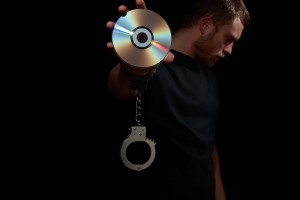RIAA Caught With Its Hand In The Illegal File-Sharing Cookie Jar
Wanting your cake and eating it, too. The kettle calling the teapot black? Both are adages that perfectly describe the hypocritical pickle that the Recording Industry Association of America currently has itself in.
In case you haven’t heard the news already, RIAA staffers have been accused of illegally downloading copyrighted material using Bittorrent, a peer-to-peer file sharing program. Among the list of the alleged ill-gotten goods is music from rap moguls Kanye West and Jay-Z, along with five seasons of the dark drama “Dexter,” and much more. The news is a big deal considering that the RIAA has led the fight against online piracy and has even successfully sued thousands of alleged file sharers.
 The story came to light after a file-sharing advocacy blog tracked the IP addresses assigned to the RIAA to the illegal downloads. So far the RIAA has denied that their people were responsible for the downloads and have instead claimed that it was done by third-party RIAA contractors. It’s very ironic considering that the RIAA is using the very same alibi that it so vehemently denied the defendants named in their lawsuits from using at trial. But like any good lobbyist group, the RIAA is of course without shame and sees no trouble with its hypocrisy.
The story came to light after a file-sharing advocacy blog tracked the IP addresses assigned to the RIAA to the illegal downloads. So far the RIAA has denied that their people were responsible for the downloads and have instead claimed that it was done by third-party RIAA contractors. It’s very ironic considering that the RIAA is using the very same alibi that it so vehemently denied the defendants named in their lawsuits from using at trial. But like any good lobbyist group, the RIAA is of course without shame and sees no trouble with its hypocrisy.
There’s a lot of good that comes with a story like this, other than the delicious irony, of course. For starters, it puts the issue of online piracy back into the minds of the public and helps start the discussion on the subject again. Though it may seem frivolous since this country appears to have enough problems right now, piracy affects not just the industries that produce the materials, but also the consumers who suffer from the increased costs of admission to movies and music as a byproduct. More importantly, however, stories like this one also point to the need for modification of the current way the industry and out government is dealing with the issue altogether.
Despite what the RIAA may like the public to believe, there are currently no laws in place that prohibit the free online sharing program. However, don’t misunderstand this to mean that the companies and people that the RIAA represent don’t have a legal leg to stand on because they most certainly do under copyright law. When one owns the copyright to a piece of work that person and/or entity has the sole right to reproduce, sell, and perform the copyrighted work. Courts have interpreted the first of these copyright rights, the right to reproduce, as also protecting holders from having their works illegal shared for free online because in essence the downloading of a digital version under the court’s interpretation is the same as reproducing the work in violation of copyright laws. This means file sharers who download and upload copyright works are all in violation of the law in this area.
Where it get muddled, however, is when the RIAA tries to use the same argument to prevent the use of file-sharing programs and Bittorrent websites which host the files used to download the copyrighted materials in question. Without getting too bogged down in legalese, the RIAA has argued that file-sharing programs like these are secondary infringers of copyright law since, as the RIAA argues, they encourage and enable the illegal downloading to occur.
Now, though Bittorrent and programs like it can be used to illegally download copyrighted materials, they are also used legitimately to distribute legally available files, programs, movies, music, and everything else that you can imagine. Furthermore, the internet itself also has websites that host illegal materials not meant for free distribution, and also host the same aforementioned legal files, as well.
My point is that pushing to ban programs like Bittorrent would create an unfair and unclear distinction on what is and isn’t a legitimate way to share files. Banning peer-to-peer networks could easily lead to someone making an argument that the entire internet in America should be shut down, too.
Sometimes the best way to handle a situation isn’t to fuss with it over and over again, but rather to leave it as it is and let nature take its course. In the case of illegal file-sharing, this means continuing to simply use the current copyright laws and rules of evidence that we have in place to pursue copyright infringers. Because anything more would simply lead to cyber marshal law, and what cowboy would be crazy enough to police that?


Comments